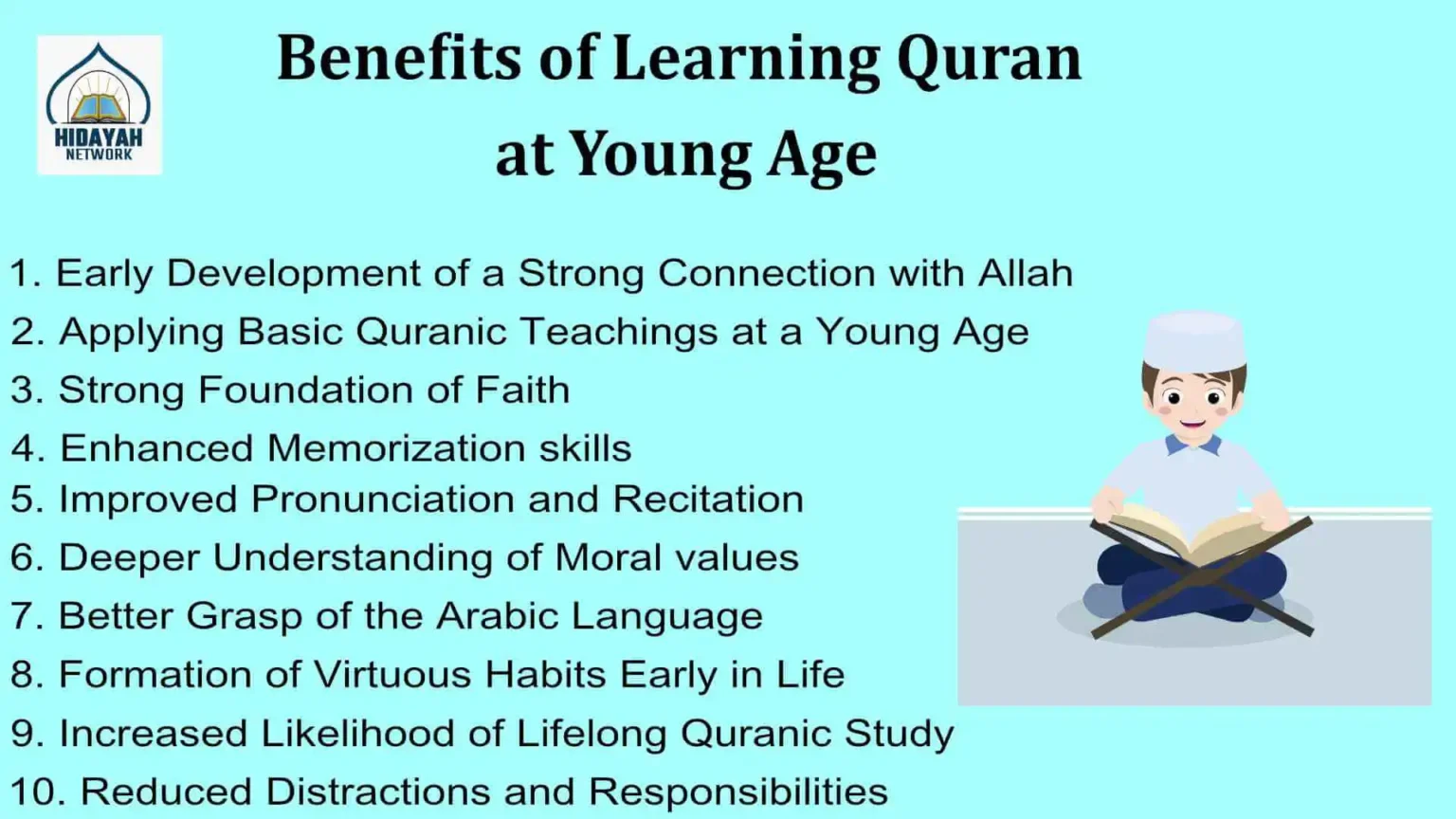Benefits of Learning Quran at Young Age

- Hidayah
- Network
- | Role: Hidayah Network

Learning the Quran at a young age brings many benefits to a young one’s life. These benefits transform your life into something positive, and Allah (SWT) is recommended. Today, we want to share some of the benefits of learning Quran at a young age. Once you know these benefits, you’ll have all the encouragement and motivation to learn the Quran.
The benefits of learning the Quran at an early age include early development of a strong connection with Allah (SWT), being able to apply basic Quranic teaching from a young age, enhanced memorization skills, a better grasp of the Arabic language, ultimately founding a strong connection with Allah (SWT). Let’s dive into more detail regarding these benefits and see what special value they hold for you!
Table of Contents
Toggle10 Amazing Benefits of Learning Quran at a Very Young Age
1. Early Development of a Strong Connection with Allah
Encouraging children to learn the Quran from a young age lays the foundation for a lifelong, intimate relationship with Allah. By starting early, kids can grow up with a deep sense of spirituality and faith. They become accustomed to regular Quran recitation, which helps foster a strong connection with Allah.
When children learn to understand Quranic verses emphasizing gratitude or compassion, they are more likely to develop an early appreciation for these values, incorporating them into their everyday lives. This strong connection with Allah can provide guidance, strength, and solace throughout their lives. If you’re looking for ways to learn Quran for beginners, get started!
2. Applying Basic Quranic Teachings at a Young Age
Teaching kids to apply basic Quranic teachings from a tender age is a priceless gift. It enables children to internalize fundamental moral and ethical principles, which can shape their character positively. When children learn about the importance of honesty, they grasp the concept and put it into practice by being truthful in their words and actions.
The Quran’s emphasis on kindness and respect towards parents and others instills these values early on.
As children consistently apply these teachings, they;
- Develop a sense of empathy and integrity
- Forming the basis for strong
- Virtuous character development throughout their lives.
Get 40% OFF Now!
3. Strong Foundation of Faith
A strong foundation of faith is a profound benefit for children to learn to read Quran. The Quran provides a solid framework for understanding the tenets of Islam and belief in one God. Children gradually develop a comprehensive understanding of their religion by learning Quranic verses that speak about the oneness of Allah and the importance of faith.
As they grow, this foundation enables kids to;
- Engage in deeper theological discussions and confidently practice their faith.
- Instills in them a sense of identity, belonging, and purpose.
- Can be a source of strength in times of uncertainty and doubt.
4. Enhanced Memorization skills
Quran learning rewards children with improved memorization skills. The Quran is traditionally memorized through “Hifz,” where individuals commit the entire text to memory. Starting at a young age is advantageous as children’s brains are more receptive to memorization, making it easier to commit verses and chapters to memory.
The discipline required for memorization cultivates valuable skills such as focus, attention to detail, and persistence. Moreover, memorizing the Quran enhances cognitive abilities, facilitating better memory retention in other areas of life, from academics to everyday tasks.
5. Improved Pronunciation and Recitation

The importance of correct Quran recitation cannot be overstated.
- Children learning to recite the Quran at a young age are more likely to develop accurate pronunciation and recitation skills.
- They develop proper delivery of the Quranic verses and impart a profound understanding of the Arabic language.
- A strong foundation in Arabic enhances their ability to understand the Quran’s original text.
- Additionally, improved pronunciation and recitation skills allow children to participate more actively in religious gatherings and prayers.
6. Deeper Understanding of Moral values
Teaching children to understand the Quran from an early age imparts a profound understanding of moral values. As kids delve into the Quranic verses, they encounter stories and parables that illustrate principles like compassion, justice, and patience.
The story of Prophet Joseph (Yusuf) exemplifies forgiveness and resilience. By internalizing these stories, children learn about moral values and witness how they are applied in real-life situations. This firsthand exposure to moral teachings helps them better understand right and wrong.
7. Better Grasp of the Arabic Language
Understanding the Quran also equips children with a better grasp of the Arabic language. The Quran, written in classical Arabic, contains intricate linguistic patterns and vocabulary.
As children explore the Quranic text, they become familiar with Arabic’s unique structure and syntax. This knowledge facilitates deeper comprehension of the Quran and enhances their language skills in general.
8. Formation of Virtuous Habits Early in Life
Encouraging children to learn the Quran leads to forming virtuous habits from an early age.
- Quranic teachings emphasize daily acts of worship, such as prayer, charity, and good deeds.
- When children engage with these practices, they develop routines centered around spirituality and benevolence.
- The habit of performing daily prayers instills discipline and devotion in their lives.
As these habits become ingrained, children grow up with a strong sense of responsibility and empathy, making them compassionate and mindful individuals who actively contribute to the welfare of their communities.
9. Increased Likelihood of Lifelong Quranic Study
Introducing children to the Quran at a young age increases the likelihood of lifelong Quranic study. Their initial exposure to the Quran evolves into a continuous pursuit of knowledge as they grow.
It becomes a part of their identity, fostering a deep connection to the Quran that endures through adulthood. This lifelong journey of Quranic study enables individuals to delve into its profound meanings, engage in scholarly discussions, and become community leaders.
10. Reduced Distractions and Responsibilities
Learning the Quran at a young age gives children the advantage of reduced distractions and responsibilities. Unlike adulthood, childhood is characterized by relatively fewer obligations, making it an ideal time for Quranic learning.
Children have more time and mental capacity to focus on understanding the Quran, as the complexities of adulthood haven’t yet burdened them. This early start allows them to delve deeper into the Quran’s teachings without the demands of a career, family, or other commitments that often arise later in life.
Learn to Read the Quran at a Young Age from Our Quran Tutors
At Hidayah Network, we take immense pride in providing a superior platform for young learners to begin their journey of Quranic education. Our Quran classes for kids and beginners are designed to offer a holistic and enriching experience.
With a team of highly skilled and experienced Quran tutors, your child will receive personalized guidance, ensuring that their learning journey is both effective and enjoyable.
- Expert Quran tutors provide personalized guidance.
- Flexible schedules cater to the needs of young learners.
- Interactive and engaging Quran classes for beginners.
- A structured curriculum ensures comprehensive learning.
- Innovative teaching methods make Quran learning easy and enjoyable.
Final Words
The benefits of learning the Quran at a young age are both profound and far-reaching. Encouraging children to understand the Quran and its teachings from their early years can lead to a strong connection with Allah, applying essential moral values, developing a solid faith foundation, and more.
Hidayah Network stands as the preeminent choice for those seeking to instill a love for the Quran in the hearts of young learners.
Most Important FAQs
Basic knowledge about the Quran for kids includes understanding that it is the holy book of Islam, its importance in the Muslim faith, and the belief in its divine origin and guidance.
The Quran can be introduced to kids as early as three to four years old, but the age at which they learn it in-depth varies based on individual readiness and parental guidance.
Learning the Quran is important for kids as it imparts moral values, a strong connection with Allah, and a sense of identity within the Muslim community, guiding them toward a virtuous and fulfilling life.
To make the Quran interesting for kids, parents and educators can use colorful, age-appropriate Quranic stories, interactive apps, games, and recitations, creating a positive and enjoyable learning environment that captures their attention and curiosity.

About Author
